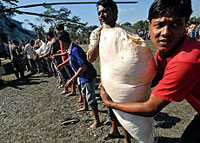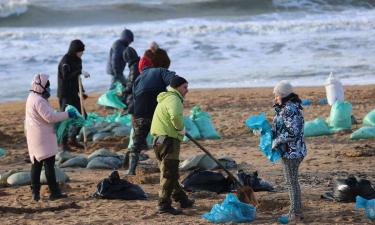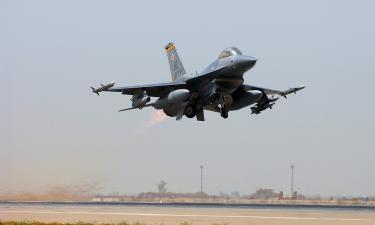US Navy to deliver food and water to Cyclone Sidr victims
U.S. navy officers prepared to help thousands of inhabitants of ravaged Bangladesh coast who survived Cyclone Sidr. They are going to deliver food and clean drinking water to the cyclone victims.

The USS Kearsarge, carrying about 20 helicopters and much-needed relief supplies, was docked off the country's coast as naval officers made arrangements to deliver aid to remote villages that had been destroyed by the storm.
"The program is starting today," said U.S. embassy spokeswoman Amy Vrampas. "We're ramping up and they're getting their team in place."
There are 13 Bangladeshi military officers on the Kearsarge who will work with the U.S. officers to coordinate the relief efforts, Vrampas said.
The arrival of the USS Kearsarge came as authorities and aid workers warned that Bangladesh faces acute food shortages after the storm destroyed crops and homes across a large swath of the country.
"We are here to help the people in their time of need," Adm. Timothy Keating, the top U.S. military commander in the Pacific Ocean, told reporters.
A second ship, the USS Essex, would arrive in coming days, Keating said.
U.S. medical teams have been distributing water purification tablets in the stricken zones to prevent outbreaks of waterborne diseases, said Geeta Pasi, the top U.S. diplomat in Dhaka.
With many drinking water wells destroyed by the cyclone, the need for clean water was critical to ward off cholera and severe diarrhea.
"All the ponds and reservoirs were contaminated when the storm surge rolled over the area," said Selim Mollah, a villager in a battered district near the Sunderbans mangrove forest.
"I have lost eight members of my family," she said. "We are not getting any drinking water anywhere."
The United Nations allocated another US$14.7 million in emergency response fund, much of which will go toward providing fresh water, a U.N. news release said Saturday.
"This funding will enable U.N. systems to provide lifesaving drinking water equipment for communities at risk from waterborne diseases and other vital assistance," said Renata Dessallien, the U.N. Resident Coordinator in Dhaka.
Bangladesh has received pledges of international aid of more than US$450 million, said Food and Disaster Management secretary Mohammad Ayub Mia. Much of that comes from a US$250 million pledge from the World Bank.
Since the Nov. 15 storm hit southwestern Bangladesh , officials and relief agencies have struggled to get rice, drinking water and tents to remote villages.
"We are moving as fast as we can to reach aid to the affected people," said Shahidul Islam, a top local official. "We are not sitting idle."
The government has pledged to feed more than two million people left destitute by the storm, which killed about 3,200 people.
Authorities will distribute 15 kilograms (33 pounds) of rice per month to each of the estimated 2.5 million people, many of them in crowded relief camps, starting Dec. 1, said Tapan Chowdhoury, the government's adviser on food and disaster management. The program will last at least four months, he said.
Kelly Stevenson, the Bangladesh director of Save the Children, said the charity estimates that 50 to 90 percent of the region's rice crop has been destroyed, leaving up to 3 million people at risk of food shortages over the next six months.
But aid workers were still struggling to bring aid to the worst-affected coastal region, where a shortage of supplies has led to overwhelmed relief centers.
The official death toll stood at 3,199, said Maj. Maim Uddin, a spokesman for the army that is coordinating the relief and rescue work.
The Disaster Management Ministry said 1,724 people were missing and 28,188 people had been injured. It said the cyclone destroyed 458,804 houses and partially damaged another 665,529.
Subscribe to Pravda.Ru Telegram channel, Facebook, RSS!




